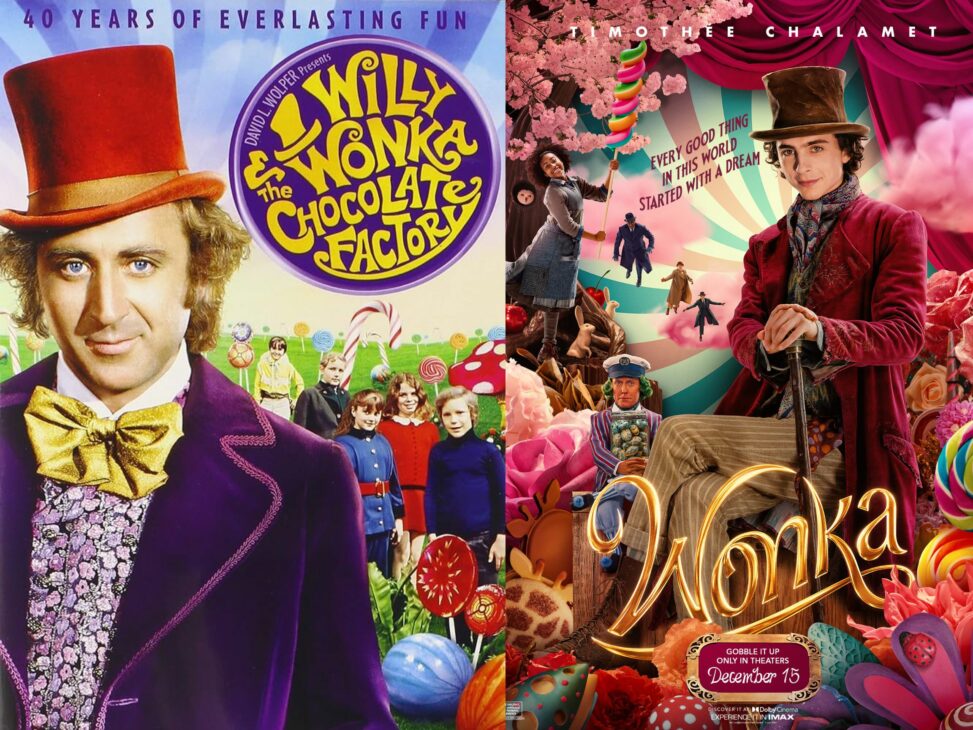From the famous children’s novel Charlie and the Chocolate Factory published in 1964, to the series’ newest film Wonka released last year in 2023, Willy Wonka has become a staple in family fiction across the world . Shortly after the first book was published, Willy Wonka & the Chocolate Factory was released in 1971 transforming the book into what would soon become a globally recognized family favourite film and musical.
The main character Willy Wonka was played by Gene Wilder in the original. In this movie we see the actor portrayed as a friendly older man with bright blonde curly hair and blue eyes. In the original film Willy Wonka had an upbeat and witty personality. Some would even consider his friendliness slightly sinister as he would speak through mind games, riddles, and crafty speech. His age would also be a leading contributor to his intelligent personality where the audience would quickly learn his age completes the whimsical character that he is. Although Charlie & the Chocolate Factory is known as a family movie, the original film had nuances of dark humour and unpredictability. Due to the hints of mystery and bleak comedy, audiences could be left questioning the true intentions behind Wonka’s chummy personality.
The Willy Wonka film released in 2023 had many changed aspects of the movie, one of which being the main character. Willy Wonka in this newer film was played by a much younger actor. The famous millennial Timothée Chalamet was just 26 years old during filming. Most today would consider the role played by a younger man as idealistic while others would like to see the original attributes of Willy Wonka’s older age brought into the 2023 film. The new Willy Wonka was portrayed with different personality traits alongside his complete different physical appearance. Willa Wonka now had dark brown hair, dark brown eyes, and a much thinner body type while also appearing much more boyish as an adolescent played the role of Wonka rather than an older man in the original film. In the 2023 film Wonka’s character was much less witty and sinister and more optimistic and curious. This movie changed Wonka’s effects on the film to be much more youthful taking away from the wisdom found in elder characters and replaced it with a new hope that Wonka would have a long life ahead to pursue his adventurous passions.
Not only did they completely change Wonka’s physical appearance in the new film, but filmmakers also revamped the personality and development of this main character. The complete change in characters would suggest that the filmmakers wanted to appeal to a younger audience. The younger Wonka has a much more vulnerable display of emotions in the newer film leaving younger audiences with more room to relate to the main character. The change in roles demonstrates movement away from stereotypes in many ways, one of them being breaking away from the eccentric stereotype found in intelligent protagonist roles. Examples of characters having the highly intelligent but detached personality are seen in a handful of different films including Captain Jack Sparrow from Pirates of the Caribbean Series and the Joker in the Marvel movie series. In the two films there was also a shift in the underlying themes. The 2023 movie would refocus on empathy, kindness, and creativity rather than greed , materialism, and morality.
The new film would really aid in the development of younger generations. Although the new Willy Wonka could be overwriting the originality of Wonka’s character, its effects are quite positive. In the original film we see Wonka as a higher authority who judges children’s bad behaviour while in the new film Wonka is much younger and the audience gets insight on real-world entrepreneurship experiences and resilience. Wonka in the new film is a new compassionate dreamer rather than solely a genius, encouraging audiences to find confidence in self-worth and to work for your dreams. The new Wonka reminds audiences that you shouldn’t give up on your dreams and inspires for more passion driven efforts to success. The Charlie & The Chocolate Factory series altogether have positive societal backlashes. The original Willy Wonka did have many different visuals and character depictions than the Wonka of 2023, but both movies share the same message of hope, humility, and gratitude. The two movies may appeal to different demographics through the depiction of Wonka, but the storyline remained the same.
Bibliography
Baybrook, Loren Pq. “The Mirror of Adolescence: Willy Wonka, the Social Contract, and a Good
Mom.” Film & History: An Interdisciplinary Journal 54, no. 1 (June 1, 2024): 52–63. https://research.ebsco.com/linkprocessor/plink?id=12a2840d-47fd-32c0-b867-318cfd577244.
Bi, Yahua, Jie Yin, and Insin Kim. “Fostering a Young Audience’s Media-Induced Travel Intentions: The
Role of Parasocial Interactions.” JOURNAL OF HOSPITALITY AND TOURISM MANAGEMENT 47 (June 1, 2021): 398–407. doi:10.1016/j.jhtm.2021.04.011.
Bushard, Brian. “‘Wonka’ Projected To Gross $40 Million This Weekend: Here’s How That Compares To
2023’s Sequels And Reboots.” Forbes.Com, December 15, 2023, N.PAG. https://research.ebsco.com/linkprocessor/plink?id=e6ee4863-ce59-3680-a835-5842a4c0290c.
Ellerhoff, Steve Gronert. “A Psychology of Greed in Charlie and the Chocolate Factory.” In Critical
Insights: Greed, edited by Robert C.(ed.) Evans, 238–52. Grey House Publishing, 2019. https://research.ebsco.com/linkprocessor/plink?id=884a744f-3079-306d-8ff5-99aa5290e96d.
Rudd, David. “Willy Wonka, Dahl’s Chickens and Heavenly Visions.” Children’s Literature in
Education 51, no. 1 (March 1, 2020): 125–42. doi:10.1007/s10583-018-9366-6.
Ruppenstein, Ann. “Walk in the Footsteps of Timothée Chalamet in This Wonka Inspired Tour.” Travel
Courier, January 11, 2024, 1–5. https://research.ebsco.com/linkprocessor/plink?id=2c98593c-6e8b-37f6-aca9-3bb0fd58ff11
Winston, Christine N. “Evaluating Media’s Portrayal of an Eccentric-Genius: Dr. Sheldon
Cooper.” Psychology of Popular Media Culture 5, no. 3 (July 1, 2016): 290–306. doi:10.1037/ppm0000060.


Jamaal Cooper
This essay is a great comparison of “Willy Wonka and The Chocolate Factory” (1971) and “Wonka”, you can benefit from a more balanced comparison of the films overall impact and a deeper exploration of the narratives and shifts.
You effectively highlight the differences in Wonka’s physical appearance and personality traits. The transformation of Willy Wonka from a mysterious, older, and slightly mischievous character in the original film; to a young, hopeful, and expressive one in the newer film. You argue that this was likely aimed at appealing to a younger audience, making Wonka more relatable and less eccentric. You also note that the 2023 film emphasizes themes like empathy, creativity, and resilience, while the original had undertones of greed and moral judgment.
The lack of scholarly sources to film theory or reviews, which would have strengthened the analysis. By including expert opinion and scholarly critiques, you could have provided more authoritative looks into the films’ cultural impact or narrative structure.
One aspect you may have missed is the deeper exploration of how these changes reflect broader societal or cinematic trends, such as the evolution of family films or character types. Additionally, you could have discussed the shift in Wonka’s portrayal that heavily influences the films’ messages about authority, morality, and leadership.
Finally, the two images of Willy Wonka, one older and eccentric, the other younger and idealistic do add to the discussion. You could have also used this in the essay to expand on how the visual changes serve as metaphors for the films’ broader themes.